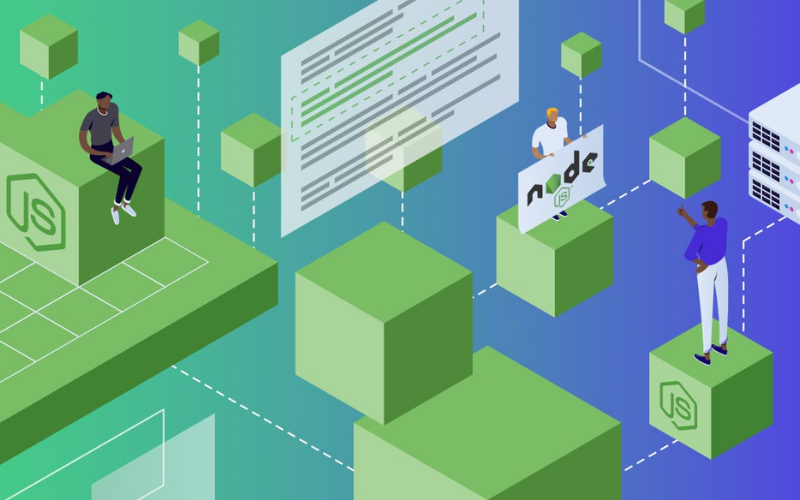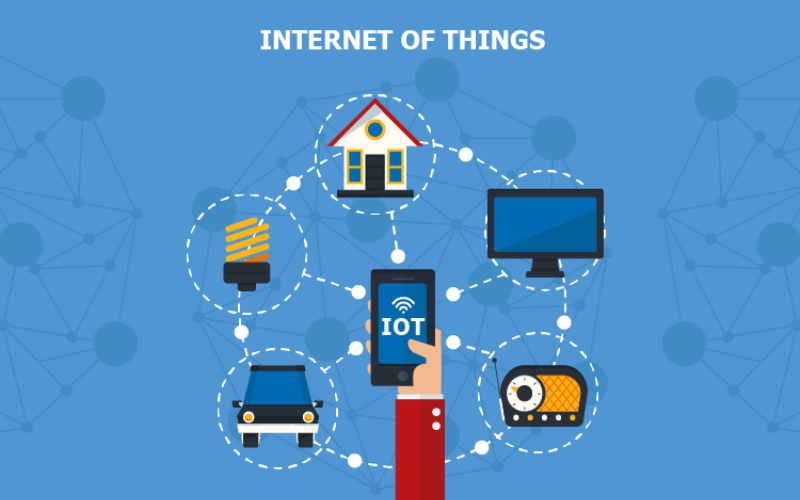Node.js is a runtime
environment for executing JavaScript code. There are many types of applications
you can build with Node.js, including highly scalable web programs that can
manage multiple user requests at once.
Without creating a new
thread for each request made by the user, Node.js operates as a single process.
Additionally, it performs an I/O action by granting access to a file system or
a database.
Node.js establishes a
backbone for web programs in this way to offer better support for multiple
concurrent connections.
Although Node.js is
typically used by app developers to create fantastic online apps, it has a wide
range of applications that business owners can benefit from. Some of the
well-known Node.js usage examples include real-time conversations, single-page
apps, online payment systems, streaming platforms, offsite collaboration tools,
and other programs.

Node.js users are aware that
JavaScript is the preferred language for creating a dynamic website for
business. Many knowledgeable web developers today use Node.js as a platform to
speed up their back-end development whilst continuing to use the same
time-tested language, JavaScript.
In the following, we’re
going to introduce different types of applications you can build with Node.js.
Social
media apps
Today, any app developer
agrees that creating a top social media app is such a difficult task. You
should put a lot of effort into making your product stand out given the number
of competitors on the market. Your product should perform well, be interactive,
and be scalable in order to outperform the competition.
That said, the first and
perhaps the most relevant Node.js usage on our list is creating social media
apps.
You do need this tool to
create a social media app with a reliable back end and quick load balancing and
develop incredibly scalable and effective applications.
*️⃣ Read More: How to Develop the Best Travel Apps in 2022 That Stand Out?
Real-Time
chat apps
Any online communication
technology that allows for the live transmission of messages in the form of
text, audio, or video from a sender to a recipient is referred to as real-time
chat.
One-to-one or one-to-many
group chats based on IM (instant messaging) or IRC (Internet Relay Chat)
technology are examples of real-time chats.
Real-time chats are often
utilized in social networks, on websites for business, and basically everywhere
else online.
Real-time chat servers are
among the types of applications you can build with Node.js, since all essential
features for creating real-time chats of any complexity are provided by this
tool.
Particularly, Node offers app
developers a robust Event API that makes it simple to build specific types of
objects (called "emitters") that routinely emit named events that are
listened to by event handlers.
Node.js usage includes
creating server-side events and push notifications, which are frequently used
in real-time applications such as instant messaging.
In the past, creating a
web-based app without a third-party plugin was difficult. With node.js, this
isn't a problem anymore because app developers can relocate time-consuming
activities off of the main JavaScript thread thanks to Node's primary I/O
paradigm.
This implies that the main
JS thread won't be impacted and the UI won't lag because the Node server can
devote all of its resources to process requests from other users in the form of
chat messages.
With this open-source
platform, app developers may create real-time chats with less latency and
faster data connections.
Streaming
Services
One of the most useful types
of applications you can build with Node.js is streaming apps. These types of
apps run the software on the user's local workstation, in contrast to remote
server apps.
Application streaming
enables on-demand downloading of specific portions of the application without
taxing the server or the local machine.
Only the portions of the
application required for bootstrapping are first downloaded; the rest can be
downloaded in the background as needed.
The application can operate
totally without any kind of network connection once it has been downloaded.

The program might start
server requests if you need to save data in your account. The same is true for
how server events could update your local app without significantly increasing
network traffic.
Node.js's native Stream API
makes it a great choice among app developers for creating these kinds of
streaming apps. The interface of Node.js in particular provides reading and
writable streams, which may be processed as well as monitored effectively.
Stream instances, which are
essentially Unix pipes, enable the transmission of portions of the app's
executable code to the local system while maintaining an open connection for
the demand-driven download of new components.
Users can pipe requests to
one another and transmit data directly to a destination using streams.
Additionally, streams only
need an open connection to transmit application data from one location to
another; they do not require caching or temporary data.
Complex
Single-Page Applications
The next important Node.js
usage for app developers and business owners on our list is SPAs. With the aim
of offering a user experience comparable to a desktop software, single-page
apps (SPAs) are a common method to web development in which a whole application
fits on a single page.
All client-side scripts in
SPAs are loaded into a single HTML page, which serves as the application's main
entry point.
Due to its effective
handling of concurrent calls and the demanding I/O demands typical of SPAs,
Node.js is an excellent fit for these types of applications.
Your users will appreciate
the quick loading single-page app you have with this server-side technology.
The fact that data is
flawlessly updated in the event loop is another fantastic benefit of Node.js
usage while creating your SPA.
On a single-page app, new
data requests shouldn't be refreshed repeatedly in this way. The fact that Node.js
is written in JavaScript as many well-known JavaScript frameworks (such as
Ember, Meteor, React, and Angular) useful for creating SPAs makes it a viable
choice for SPA development.
There is less context
switching between Node.js and browsers because both utilize JavaScript, and app
developers can use the same data and programming language structures as well as
modular techniques on both the client and the server side.
Internet
of Things
IoT systems are undoubtedly
among the most important types of applications you can build with Node.js.
The Internet of Things (IoT)
is a network of gadgets that can communicate and share data, including sensors,
transmitters, actuators, and other objects with embedded electronics.
IoT systems typically
transmit data from devices to servers, which then transfer it to different applications
for processing and user display.
It can be difficult to manage inquiries and data flow from and
amongst IoT devices because there could be hundreds of them.
Since 2012, when IoT usage skyrocketed,
Node.js usage also skyrocketed and it has emerged as a top choice among
businesses and organizations looking to build both private and commercial IoT
systems.

The capacity of Node.js to
handle multiple concurrent queries and events sent by hundreds or even millions
of networked devices is undoubtedly its most salient benefit as a back-end for
such networks.
Node.js web servers are not
slowed down by the flood of requests and data flowing from IoT devices because
of their event-driven architecture and concurrent processing that is
appropriate for I/O-intensive tasks on the IoT network.
Because of this, Node.js
functions quickly as a middleware between these sensors and the databases used
to store the data they generate.
Node.js usage allows IoT
developers to take advantage of its modest resource requirements while working
in data-intensive applications.
Low memory requirements make
it simple to integrate Node.js software into single-board computers like
Arduino, which are frequently used to create the digital components of IoT
systems.
Microservices Architecture
Microservices are among the
important types of applications you can build with Node.js.
Using a microservices
architecture, app developers can create an application as a collection of
autonomous, compact, and modular services, each of which performs a particular
function in the business logic and runs a separate process.
Microservices often exchange
JSON or another type of data structure through the HTTP/REST protocol.
Many important apps,
including Netflix, Amazon, eBay, and Facebook which changed from being
monolithic programs to a collection of microservices, have grown very
successful in recent years thanks to the microservices architecture.
Node.js is a great platform
for building microservices and simple APIs to connect them.
The Koa and Express
frameworks, in particular, are available in the Node.js source and make it
simple to mount many server instances and create routing addresses for each
microservice.
Express and Node.js allow app
developers to build incredibly versatile modules that are in charge of
particular areas of the application.
By Node.js usage, Microservices
greatly speed up, improve, and scale your applications' productivity, maintainability,
and scalability.
The efficient management of
the division of labor within your technical teams is made possible by the use
of microservices architecture, which enables them to focus on particular
activities without influencing other aspects of your program.
Conclusion
Node.js is an event-driven
JavaScript runtime environment that supports non-blocking I/O (Input/Output)
and can handle several concurrent events in a single thread.
Node.js is extremely quick,
light, scalable, and efficient at handling the data- and I/O-intensive
workloads typical of various kinds of web applications thanks to non-blocking
I/O.
There are many types of
applications you can build with Node.js and it is particularly excellent for
creating apps that frequently move data from a client to a server, have several
concurrent requests, and involve a lot of client-side rendering.
Node.js should always be app
developers first choice for developing applications that require a lot of
data-driven I/O. Node.js also offers several benefits for software development,
such as high scalability, quick data processing, and enhanced responsiveness. Additionally,
you can create a large range of other app types using this technology.
Please contact us if you
have any questions regarding Node.js usage or require assistance with the
Node.js app development process.
We
have a group of knowledgeable app developers who can assist you in creating
anything you require.